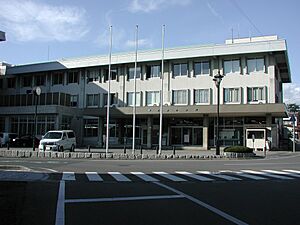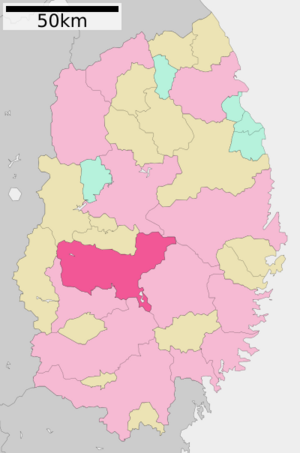Hanamaki, Iwate facts for kids
Quick facts for kids
Hanamaki
花巻市
|
|||||||||||||
|---|---|---|---|---|---|---|---|---|---|---|---|---|---|
|
City
|
|||||||||||||

Hanamaki City Hall
|
|||||||||||||
|
|||||||||||||

Map of Iwate Prefecture with Hanamaki highlighted in pink
|
|||||||||||||
| Country | Japan | ||||||||||||
| Region | Tōhoku | ||||||||||||
| Prefecture | Iwate | ||||||||||||
| Area | |||||||||||||
| • Total | 908.39 km2 (350.73 sq mi) | ||||||||||||
| Population
(March 31, 2019)
|
|||||||||||||
| • Total | 94,691 | ||||||||||||
| • Density | 104.2405/km2 (269.9816/sq mi) | ||||||||||||
| Time zone | UTC+9 (Japan Standard Time) | ||||||||||||
| Phone number | 0198-24-2111 | ||||||||||||
| Address | 9-30 Kajo-cho, Hanamaki-shi, Iwate-ken 025-8601 | ||||||||||||
| Climate | Dfa/Cfa | ||||||||||||
|
|||||||||||||
Hanamaki (花巻市 (Hanamaki-shi)) is a city located in Iwate Prefecture, Japan. As of March 31, 2020, about 94,691 people lived there in 37,773 homes. The city covers an area of 908.39 square kilometers (350.73 sq mi).
Hanamaki is famous for a few cool things! It's the birthplace of a well-known writer and poet named Kenji Miyazawa. It's also known for a special local noodle dish called Wanko soba and its many relaxing onsen (hot spring) resorts.
Contents
Geography and Nature
Hanamaki is in the middle of Iwate Prefecture. It sits in the Kitakami River valley, where three other rivers join the Kitakami River.
To the west, the city rises into the foothills of the Ōu Mountains. The tallest point here is Mt. Matsukura, which is 968 meters (3,176 ft) high. To the east, you'll find the Kitakami Mountains. The highest peak in this range is Mount Hayachine, standing tall at 1,917 meters (6,289 ft).
Hanamaki also has some beautiful lakes and natural areas. Lake Tase is the largest reservoir, and Lake Hayachine is known for its amazing views with steep mountains around it. Lake Toyosawa is another pretty lake in the western part of the city.
Part of Hanamaki is inside the Hayachine Quasi-National Park, which is a protected natural area. There's also a chain of 12 hot springs called the Hanamaki Onsenkyo Village, located along the Ōu Mountains.
Nearby Cities and Towns
Hanamaki shares borders with several other places in Iwate Prefecture:
Climate and Weather
Hanamaki has a humid subtropical climate. This means it has mild summers and cold winters. The average temperature in Hanamaki is about 10.4°C (50.7°F) each year.
The city gets about 1,324 millimeters (52.1 in) of rain every year, with September usually being the wettest month. The warmest month is August, with temperatures around 24.0°C (75.2°F). January is the coldest month, with temperatures around -2.3°C (27.9°F).
Population Changes
The number of people living in Hanamaki grew steadily until around the year 2000. Since then, the population has slowly decreased.
- 1920: 69,110
- 1950: 102,933
- 1980: 105,678
- 2000: 107,175
- 2020: 93,193
History of Hanamaki
The area where Hanamaki is today has been settled for a very long time, even since the Jōmon period (which was thousands of years ago!). It was part of an old Japanese province called Mutsu Province.
During the Sengoku period (a time of civil war in Japan), different samurai families controlled the area. Later, during the Edo period, the Nambu clan took control and ruled the Morioka Domain. Hanamaki grew into an important shukuba (a post station or rest stop) along the Ōshū Kaidō highway during this time.
In more modern times, Hanamaki became a town on April 1, 1889. Over the years, it merged with several nearby villages and towns. In January 2006, Hanamaki became much larger when it merged with the towns of Ishidoriya, Ōhasama, and Tōwa.
Economy and Jobs
The main type of work in Hanamaki is agriculture, especially dairy farming. This means many people work with cows to produce milk and other dairy products. Hanamaki is also known for making electrical appliances.
Another important part of the local economy is tourism, especially because of the many onsen (hot spring) resorts in the area. People visit these hot springs to relax and enjoy the natural warm water.
Education
Hanamaki is home to Fuji University, which is a private university.
The city government runs 19 public elementary schools and 11 public junior high schools for younger students. For older students, the Iwate Prefectural Board of Education operates seven public high schools. There is also one special education school in the prefecture.
Getting Around Hanamaki
Hanamaki has several ways to travel, including trains, highways, and even an airport.
Train Lines
- Tōhoku Shinkansen (Bullet Train):
- Shin-Hanamaki
- Tōhoku Main Line:
- Hanamaki
- Hanamaki Airport
- Ishidoriya
- Kamaishi Line:
- Shin-Hanamaki
- Oyamada
- Tsuchizawa
- Haruyama
Major Highways
 Tōhoku Expressway – This expressway has several exits and junctions in Hanamaki.
Tōhoku Expressway – This expressway has several exits and junctions in Hanamaki. Kamaishi Expressway – Another important expressway.
Kamaishi Expressway – Another important expressway. National Route 4
National Route 4 National Route 107
National Route 107 National Route 283
National Route 283 National Route 396
National Route 396 National Route 456
National Route 456
Airport
- Hanamaki Airport is located in the city, making it easy to fly in and out.
Fun Things to Do in Hanamaki
Hanamaki is a great place to visit with lots of interesting attractions!
- Hot Springs (Onsen): The city is famous for its many onsen (hot springs). These are natural baths with warm, mineral-rich water, perfect for relaxing.
- Kenji Miyazawa Memorial Museum: Since Hanamaki was the home of the famous writer Kenji Miyazawa, you can visit a museum dedicated to his life and works. It's a great way to learn about his stories and poems.
- Ski Slope: If you like winter sports, Hanamaki also has a ski slope where you can hit the snow.
Hanamaki Matsuri (Festival)
One of the most exciting events in Hanamaki is the Hanamaki Matsuri, an annual festival that dates all the way back to 1593! It happens on the second weekend of September and lasts for three days.
- Over a thousand dancers perform traditional dances together.
- More than one hundred small Mikoshi (portable shrines) are carried through the streets.
- Large, handmade floats showing historical or mythical scenes are paraded, with drummers, flutists, and people carrying lanterns.
- The most famous dance is the Shishi Odori (dance of the deer), where men dress up as deer and bang drums.
Attractions from Merged Towns
When Hanamaki merged with other towns, it gained even more attractions:
- Ōhasama: This area is known for its traditional Kagura dances. Kagura dancers often perform at local festivals. On a hill above Ōhasama, there's a statue that looks like the wolf costumes worn by Hayachine Kagura dancers.
- Mount Hayachine: This mountain, at 1,917 meters (6,289 ft), is the second-highest in Iwate Prefecture. It's a beautiful place for nature lovers.
- Edel Wine: Ōhasama is also known for its local wine, Edel Wine. In September, the Ōhasama Wine House hosts an annual Wine Festival.
- Japanese Dolls: Around the time of Japan's Girls' Festival, Ōhasama displays its collection of dolls. Many of these dolls are hundreds of years old! People believe they might have been given to locals by travelers from Kyoto who were on their way to trade in Hokkaidō.
- Ishidoriya: This area has a history of making sake (Japanese rice wine), connected to the Nambu Toji tradition of master brewers.
International Friendships
Hanamaki has made friends with cities in other countries:
 Rutland, Vermont, United States (since October 8, 1986)
Rutland, Vermont, United States (since October 8, 1986) Hot Springs, Arkansas, United States (since January 15, 1993)
Hot Springs, Arkansas, United States (since January 15, 1993) Berndorf, Austria (since 1965)
Berndorf, Austria (since 1965) Xigang District, Dalian, Liaoning, China (friendship city since 2010)
Xigang District, Dalian, Liaoning, China (friendship city since 2010)
Some of these friendships started with the towns that later merged into Hanamaki. For example, Ōhasama was friends with Berndorf, Austria. This friendship began because of a special type of edelweiss flower called Hayachine Usuyukiso, which grows only on Mt. Hayachine. Mountain climbers from Ōhasama and Berndorf connected over this unique flower. Ishidoriya was friends with Rutland, Vermont.
Famous People from Hanamaki
Many talented people come from Hanamaki, including:
- Koi Ikeno, a manga artist (someone who draws Japanese comics)
- El Samurai, a professional wrestler
- Shunkichi Kikuchi, a photographer
- Kazuhiro Hatakeyama, a professional baseball player
- Tetsugoro Yorozu, a painter
- Kenji Miyazawa, a famous writer and poet
- Shohei Ohtani, a professional baseball player who is very famous in both Japan and the United States
See also
- In Spanish: Hanamaki para niños
 | Bessie Coleman |
 | Spann Watson |
 | Jill E. Brown |
 | Sherman W. White |





